Our Stories
2022 Lenten Prayer Guide
Jesus Weeps Over Jerusalem
Wednesday March 2 | Ash Wednesday
Alan Thorimbert
Campus Staff, University of Victoria
The name for today’s feast day is taken from the famous line “ashes to ashes” which most of us rightly associate with funerals. Today, however, is not so much a day to meditate on death, but on our mortality, or to put it in another way, on our humanness. Today’s poem seeks to welcome us into remembering the goodness of being humans made in the image of God, with all the limits and privileges that come with our vocation.
icons of the Most High
images of Elohim carved out of the very earth
lest we think we are idols we remember:
we are but the branch of a tree
that waters from skies must nourish
that sun from the space above must enliven
but we are not the tree.
like all branches we will break
fall to the ground
and return to a resting place in the soil
death is a part of our journey,
we choose it, do not fear it.
anticipate it, rather than procrastinate from it.
we are vessels of the Creator’s life-giving Spirit,
we are vessels yes, but not objects without personhood
but personhood does not make us entities
we are cracked vessels,
and this day we remember this.
We commit ourselves to being purified,
We dedicate ourselves for sanctification
We practice the art of repenting.
This is our human duty we begin
Let us walk this right of passage
and mature.
adult and abide.
return and repent
cultivate home
as we apprentice ourselves to the Potter’s work.
in fasting, let justice roll down
become us rivers of life flowing into the desert times.

Alan Thorimbert
Campus Staff, University of Victoria

The name for today’s feast day is taken from the famous line “ashes to ashes” which most of us rightly associate with funerals. Today, however, is not so much a day to meditate on death, but on our mortality, or to put it in another way, on our humanness. Today’s poem seeks to welcome us into remembering the goodness of being humans made in the image of God, with all the limits and privileges that come with our vocation.
icons of the Most High
images of Elohim carved out of the very earth
lest we think we are idols we remember:
we are but the branch of a tree
that waters from skies must nourish
that sun from the space above must enliven
but we are not the tree.
like all branches we will break
fall to the ground
and return to a resting place in the soil
death is a part of our journey,
we choose it, do not fear it.
anticipate it, rather than procrastinate from it.
we are vessels of the Creator’s life-giving Spirit,
we are vessels yes, but not objects without personhood
but personhood does not make us entities
we are cracked vessels,
and this day we remember this.
We commit ourselves to being purified,
We dedicate ourselves for sanctification
We practice the art of repenting.
This is our human duty we begin
Let us walk this right of passage
and mature.
adult and abide.
return and repent
cultivate home
as we apprentice ourselves to the Potter’s work.
in fasting, let justice roll down
become us rivers of life flowing into the desert times.
Thursday March 3
Ruth Brown
Spiritual Formation & Prayer Director
Matthew 23:37-39 First Nations Version: “A dark cloud cast a shadow over Creator Sets Free (Jesus), and a look of pain and sorrow came upon his face. ‘Jerusalem, O Village of Peace!’ he cried out loud for all to hear, ‘You who kill the prophets and stone to death the ones the prophets sent to you! How I have longed to gather your children together, like an eagle gathers her young under her wings, but you would not have it. Look! Your house has fallen and will be left in ruins! I speak from my heart, you will not see me again until you say, ‘Blessed is the one who comes representing the Great Spirit!’”
Luke 19:41-44 First Nations Version “As Jesus rode forward, he could see the Sacred Village of Peace (Jerusalem) and tears began to run down his face. He could taste the salt from his tears as he opened his mouth in anguish. ‘Jerusalem, Jerusalem, you are the Sacred Village of Peace,’ he wept out loud. ‘Of all people, you should be the ones who would know the way of peace, but on this sacred day, the way of peace is hidden from your eyes. In the days ahead your enemies will encircle you and close in on you from every side. You will be crushed and trampled down, along with all your children. Every lodge will fall, and not even one pole, log or stone will be left standing against another. All of this will happen because you did not know it was your time for the Great Spirit to visit you.’”
A month ago, I stood with my sister and brother-in-law in a conservation area with bird seed in my hand and hope in my heart. I longed for a chickadee to land on my hand and eat what I offered. It gave me so much delight when not just one, but many little chickadees came exploring my hand and began feeding on the seed! Through faithful offering of food by many people, over and over again in this same spot, this area has become known and trusted by chickadees. This experience caused me to ponder: Does God feel this delight when I choose to trust him and land on his outstretched hand to feed? Does our faithful persevering, offering of God’s love and word to students and campers, over and over again, help to grow trust and hunger in them to come and feed regularly from God? Jesus wept, prayed, and offered himself for those who turned away. Yes, it makes a difference!
Reflect: Can you imagine Jesus weeping over you? For what might Jesus long for you? What keeps you from regularly feeding from God’s hand? Do you trust and hunger after what God offers? Can you imagine God’s delight when you land on his open hand and take time to explore and feed on what he offers? When we are satisfied, let’s keep reminding others where they can find deep satisfaction.
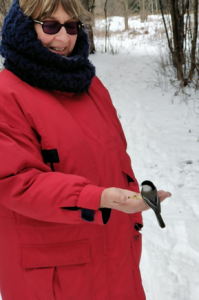
Ruth Brown
Spiritual Formation & Prayer Director
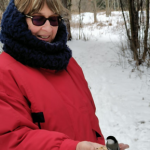
Matthew 23:37-39 First Nations Version: “A dark cloud cast a shadow over Creator Sets Free (Jesus), and a look of pain and sorrow came upon his face. ‘Jerusalem, O Village of Peace!’ he cried out loud for all to hear, ‘You who kill the prophets and stone to death the ones the prophets sent to you! How I have longed to gather your children together, like an eagle gathers her young under her wings, but you would not have it. Look! Your house has fallen and will be left in ruins! I speak from my heart, you will not see me again until you say, ‘Blessed is the one who comes representing the Great Spirit!’”
Luke 19:41-44 First Nations Version “As Jesus rode forward, he could see the Sacred Village of Peace (Jerusalem) and tears began to run down his face. He could taste the salt from his tears as he opened his mouth in anguish. ‘Jerusalem, Jerusalem, you are the Sacred Village of Peace,’ he wept out loud. ‘Of all people, you should be the ones who would know the way of peace, but on this sacred day, the way of peace is hidden from your eyes. In the days ahead your enemies will encircle you and close in on you from every side. You will be crushed and trampled down, along with all your children. Every lodge will fall, and not even one pole, log or stone will be left standing against another. All of this will happen because you did not know it was your time for the Great Spirit to visit you.’”
A month ago, I stood with my sister and brother-in-law in a conservation area with bird seed in my hand and hope in my heart. I longed for a chickadee to land on my hand and eat what I offered. It gave me so much delight when not just one, but many little chickadees came exploring my hand and began feeding on the seed! Through faithful offering of food by many people, over and over again in this same spot, this area has become known and trusted by chickadees. This experience caused me to ponder: Does God feel this delight when I choose to trust him and land on his outstretched hand to feed? Does our faithful persevering, offering of God’s love and word to students and campers, over and over again, help to grow trust and hunger in them to come and feed regularly from God? Jesus wept, prayed, and offered himself for those who turned away. Yes, it makes a difference!
Reflect: Can you imagine Jesus weeping over you? For what might Jesus long for you? What keeps you from regularly feeding from God’s hand? Do you trust and hunger after what God offers? Can you imagine God’s delight when you land on his open hand and take time to explore and feed on what he offers? When we are satisfied, let’s keep reminding others where they can find deep satisfaction.
Friday March 4
Rachel Bennett
Former Communications Staff
In my creative art piece, the ripped paper comes from commentaries I used when writing a paper on Psalm 22, the psalm Jesus quotes on the cross. I wanted to convey what I found in Matthew 23: People at the time were so invested in the law and focused on what they thought the Messiah should be like, that they missed Jesus and the message he brought. The simple gold cross over the paper represents the pure and simple faith Jesus calls us to, a message painted over all true theology.
I feel sad when I see a passage so dissected that the reader no longer sees the message in front of her, and I think Jesus felt something similar but much more powerful when he looked at Jerusalem.
Reflect: In this COVID season, are there places where you have been so invested in the law – what you think is right or wrong — that you have missed the presence of Jesus and his love. Notice Jesus looking at you and your community, and ask him what he is praying for you today.

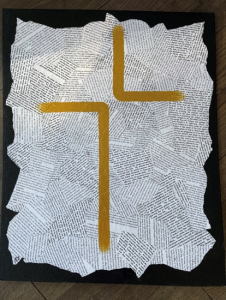
Rachel Bennett
Former Communications Staff

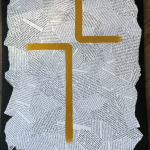
In my creative art piece, the ripped paper comes from commentaries I used when writing a paper on Psalm 22, the psalm Jesus quotes on the cross. I wanted to convey what I found in Matthew 23: People at the time were so invested in the law and focused on what they thought the Messiah should be like, that they missed Jesus and the message he brought. The simple gold cross over the paper represents the pure and simple faith Jesus calls us to, a message painted over all true theology.
I feel sad when I see a passage so dissected that the reader no longer sees the message in front of her, and I think Jesus felt something similar but much more powerful when he looked at Jerusalem.
Reflect: In this COVID season, are there places where you have been so invested in the law – what you think is right or wrong — that you have missed the presence of Jesus and his love. Notice Jesus looking at you and your community, and ask him what he is praying for you today.
Jesus is Anointed in Bethany
Monday, March 7
Nyssa Clements
Campus Minister, Fraser Valley BC
Mark 14:3-9: “She has done a beautiful thing to me,” Jesus declared. From our vantage point we know Jesus welcomed the anointing he received from this woman. She did this to prepare his body for burial. But from her vantage point, I wonder what she felt. What was going through her mind and body as she walked into that room, her precious jar of perfume in hand, knowing what she was about to do? Did she feel the judgement and rebuke of the men who said this was a waste? Did she second guess whether this was worth doing? Was she confident that Jesus would receive her anointing with open hands? Her actions were bold, yet tender, deliberate, yet full of grace. In faith, she poured out all she had, trusting her sacrifice wouldn’t be in vain.
Once the fun of summer had faded into fall, and the moving boxes had been unpacked, the loss, loneliness, and doubt I’d been ignoring began bubbling to the surface. What on earth had we just done? Being on sabbatical, I had time to think about this and wrestle with God. I felt as if we had just smashed our very precious jar of perfume and offered it to Jesus. In our case, our perfume was the security and comfort of living near family, in a province we’ve
always called home, leaving what had been stable and good work with a community who knew and loved us. I started to feel hurt that Jesus had asked us to give up so much to follow him in this season. In my hurt, I hadn’t stopped to listen for Jesus’ response to our offering.
As I prayed one day, bringing my grief and anxiety to Jesus, I imagined myself in the shoes of the woman in Bethany. In my prayerful imagination, I watched as the nard I had poured over Jesus’ head, flowed down his arms. As it dripped towards his hands, I watched as his palms turned, face up, to welcome and receive my offering. To receive me. What a wave of relief and love I felt in that moment, realizing that Jesus saw me. The offering is still costly, the challenges still great, but this tender welcome of Jesus, offered me a renewed sense of hope. I pray that you too, would know that Jesus lovingly welcomes you and your offerings each day.
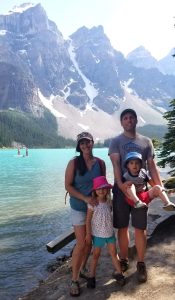
Nyssa Clements
Campus Minister, Fraser Valley BC

Mark 14:3-9: “She has done a beautiful thing to me,” Jesus declared. From our vantage point we know Jesus welcomed the anointing he received from this woman. She did this to prepare his body for burial. But from her vantage point, I wonder what she felt. What was going through her mind and body as she walked into that room, her precious jar of perfume in hand, knowing what she was about to do? Did she feel the judgement and rebuke of the men who said this was a waste? Did she second guess whether this was worth doing? Was she confident that Jesus would receive her anointing with open hands? Her actions were bold, yet tender, deliberate, yet full of grace. In faith, she poured out all she had, trusting her sacrifice wouldn’t be in vain.
Once the fun of summer had faded into fall, and the moving boxes had been unpacked, the loss, loneliness, and doubt I’d been ignoring began bubbling to the surface. What on earth had we just done? Being on sabbatical, I had time to think about this and wrestle with God. I felt as if we had just smashed our very precious jar of perfume and offered it to Jesus. In our case, our perfume was the security and comfort of living near family, in a province we’ve always called home, leaving what had been stable and good work with a community who knew and loved us. I started to feel hurt that Jesus had asked us to give up so much to follow him in this season. In my hurt, I hadn’t stopped to listen for Jesus’ response to our offering.
As I prayed one day, bringing my grief and anxiety to Jesus, I imagined myself in the shoes of the woman in Bethany. In my prayerful imagination, I watched as the nard I had poured over Jesus’ head, flowed down his arms. As it dripped towards his hands, I watched as his palms turned, face up, to welcome and receive my offering. To receive me. What a wave of relief and love I felt in that moment, realizing that Jesus saw me. The offering is still costly, the challenges still great, but this tender welcome of Jesus, offered me a renewed sense of hope. I pray that you too, would know that Jesus lovingly welcomes you and your offerings each day.
Prayer: Jesus, may we be people who cling to you and who live our lives knowing your incommensurable worth. May we be people who freely offer as we are able and trust that you will receive us and our offerings with gentleness and love.
Tuesday, March 8
Matthew 26: 6-13
Wednesday, March 9
John 12:2-8
Read John 12:2-8. Imagine the scene. Picture yourself in the story, sitting with Lazarus, Mary, and Martha. Pay attention to all your senses: what do you smell, see, taste, feel and hear?
What words or phrases stand out to you from this passage of scripture? Repeat them quietly to yourself and return to those words when your mind wanders.
As you imagine yourself witnessing this scene, what feelings rise up in you? What questions? Ask Jesus your questions and wait for his response.
Spend some time quietly with Jesus. Rest in his love for you
Thursday, March 10
The Anointing at Bethany
Come close with Mary, Martha, Lazarus
So close the candles stir with their soft breath
And kindle heart and soul to flame within us
Lit by these mysteries of life and death.
For beauty now begins the final movement
In quietness and intimate encounter
The alabaster jar of precious ointment
Is broken open for the world’s true lover,
The whole room richly fills to feast the senses
With all the yearning such a fragrance brings,
The heart is mourning but the spirit dances,
Here at the very centre of all things,
Here at the meeting place of love and loss
We all foresee, and see beyond the cross.
(From: Sounding the Seasons, Canterbury Press 2012. Used with the author’s permission)
Friday, March 11
John 12:2-8
Jesus’ Last Supper & Foot Washing
The Dignity of Work and of Workers
“Server, you remind us of our Savior’s bowl and towel” Day by Day, from Work Songs, The Porters Gate Worship Project feat. Joy Ike
Monday, March 14
Scripture:
John 13:1-20
John starts his gospel by explaining how Jesus was at work in the creation of the world, but in John 13 Jesus participates in creation in a different way, by working in it. God worked at creation, and then God became human, joining us working in creation. In Genesis 1-2 God gave dignity to work by commissioning his image bearers into work. In Jesus, God reminds us of the dignity of our work by undertaking work like ours. To us it may seem these are very different kinds of work — the creation of the world at one end of a spectrum and washing feet near the other. By recording both these events, John signals to us the dignity of both kinds of work, and thereby the dignity of all kinds of work as a means by which God’s kingdom comes.
Ponder: Listen to the song Day by Day, from Work Songs, The Porters Gate Worship Project feat. Joy Ike. What difference might it make to your work to see it as a way in which God’s kingdom comes?
Tuesday, March 15
Scripture:
John 13:4-5
Between high school and university, I worked in a shoe shop. Handling other people’s feet was work I did not enjoy. Helping people try on shoes transferred the odour of their feet onto my hands, and I carried that smell around with me throughout the day. I look back on that work as dirty and unpleasant.
Because foot washing was beneath a disciple or a Jewish slave, the task was assigned to non-Jewish slaves. But Jesus takes on the work of a lowest slave. Jesus – the Son of God – willingly did dirty work, work that was despised by those around him.
Ponder: Reflect on work that you are doing or have done that causes you discomfort. Imagine Jesus working alongside you. How might this transform your experience of that work?
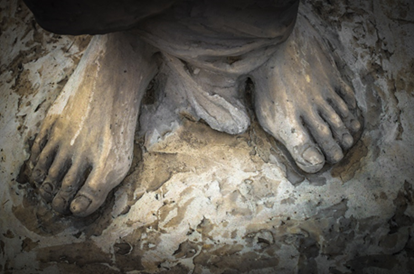
Wednesday, March 16
Scripture:
John 13:6-9
Due to concerns around the spread of covid, at the Winter Olympic games meals were delivered to athletes by robots. If we are not intentional, we can treat baristas and wait staff as robots who exist to serve us, forgetting they are human beings who bear the image of God. Peter is shocked that his teacher – someone whom he sees as greater than himself – is taking on the work of the lowest servant.
Reflect: Consider how you relate to those who work in service industries. What difference might it make if in their service of us, we saw Jesus?

Thursday, March 17
Scripture:
John 13:12-16
In Luke’s record of these events (Luke 22:24), disciples disagree about who among them is the greatest. Instruction to wash each other’s feet may have come in response to this disagreement. Jesus knows that the people whom he is serving will go on to lead his church. He knows that as the church grows, so will their power and influence. They will be tempted to think of themselves as greater than those with whom they share leadership and greater than those they lead. As a remedy to this temptation, Jesus institutes a ceremony that will act as a reminder that in his Kingdom all are equal.
Reflect: What reminders help you keep a right view of yourself and of others?
Friday, March 18
Scripture:
John 13:1-4
My eldest children are now old enough to put away their own laundry. After years of folding and sorting small peoples’ clothes, I was surprised to find myself a little sad that this was no longer part of my work as a parent. I was grieving the loss of a way that I was able to show love for my kids through serving them. In these verses we see that love (v1) combined with power (v3), leads to humble service (v4).
Pray: Ask God to help you see what opportunities you might have today to humbly serve others.
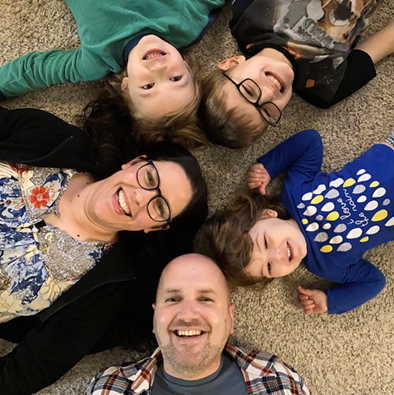
Jesus Prays for his Disciples and for Us
Monday, March 21
Alan Thorimbert
Campus Staff, University of Victoria
John 13:1-20
Sometimes we forget how much conflict is hovering in the upper room on that final night before Gethsemane and Golgotha. Conflict arises as Jesus goes to wash his friend’s feet, and Peter in his shame and discomfort says “No.” Conflict arises from confusion born of Jesus’ cryptic language about drinking his blood and eating his body. And then there are the moments between Jesus and Judas in front of the other disciples. Incredibly tense moments.
Put me in that room, and it is easy for me to imagine all my fears of losing someone becoming incredibly loud and hard to ignore. Jesus’ language around final hours and final things does not help to quell fear.
Yet Jesus’ prayer for his disciples in John 17 encourages me. I read his words, and I understand that Jesus is not leaving because we’re on bad terms. He’s heading to the cross whether our relationship improves or worsens, and he’s heading there because that is how he will fulfill all the Messianic hopes of Israel. Israel, called to be blessed by YHWH so that it might be a blessing for many. Jesus is leaving because he is the Messiah.
Our colleague and friend Justin Yuen once shared with me that it is part of our journeys as disciples to learn to say goodbye well. Over the years I have found this to be true. Goodbyes are a part of the way of Jesus and can be a spiritual rite of passage through which Jesus grows us. Jesus models that here in John 15. The upper room is a farewell party, and this is his farewell address.
Reflect: There is much talk within our organization about cultivating communities of welcome, but what about cultivating farewells? What would it look like to be communities of welcome and farewells? I find myself wondering what new missional moments we might see when we invest in sending as well as welcoming. Reflect on what makes a good farewell as we journey with Jesus through his prayer for his disciples in John 17.
Prayer: O God of beginnings and endings, make us into people who find hope in farewells, honor in goodbyes, and celebration in the passing on from death into new life

Alan Thorimbert
Campus Staff, University of Victoria

John 13:1-20
Sometimes we forget how much conflict is hovering in the upper room on that final night before Gethsemane and Golgotha. Conflict arises as Jesus goes to wash his friend’s feet, and Peter in his shame and discomfort says “No.” Conflict arises from confusion born of Jesus’ cryptic language about drinking his blood and eating his body. And then there are the moments between Jesus and Judas in front of the other disciples. Incredibly tense moments.
Put me in that room, and it is easy for me to imagine all my fears of losing someone becoming incredibly loud and hard to ignore. Jesus’ language around final hours and final things does not help to quell fear.
Yet Jesus’ prayer for his disciples in John 17 encourages me. I read his words, and I understand that Jesus is not leaving because we’re on bad terms. He’s heading to the cross whether our relationship improves or worsens, and he’s heading there because that is how he will fulfill all the Messianic hopes of Israel. Israel, called to be blessed by YHWH so that it might be a blessing for many. Jesus is leaving because he is the Messiah.
Our colleague and friend Justin Yuen once shared with me that it is part of our journeys as disciples to learn to say goodbye well. Over the years I have found this to be true. Goodbyes are a part of the way of Jesus and can be a spiritual rite of passage through which Jesus grows us. Jesus models that here in John 15. The upper room is a farewell party, and this is his farewell address.
Reflect: There is much talk within our organization about cultivating communities of welcome, but what about cultivating farewells? What would it look like to be communities of welcome and farewells? I find myself wondering what new missional moments we might see when we invest in sending as well as welcoming. Reflect on what makes a good farewell as we journey with Jesus through his prayer for his disciples in John 17.
Prayer: O God of beginnings and endings, make us into people who find hope in farewells, honor in goodbyes, and celebration in the passing on from death into new life
Tuesday, March 22 – Thursday, March 24th
Be led in prayer by Students, Alumni, and Campus Staff
Tuesday, March 22
Chelsea Davis
Simon Fraser University
God who fiercely protects us and lovingly sends us,
Give us a gritty love in these days, so that we do not become bitter with the world.
As you experience oneness in Yourself,
May we too receive a vision for complete unity in our campuses and beyond.
God, we believe, and we feel overwhelmed.
Give us a gritty hope to believe that you are still in love with the world.
As we laugh with students and repeat our early morning commute,
May we lean into our inheritance of joy –
even when seemingly fleeting, simple, or like the size of a crumb.
Remind us that all of this, every bit of it, is so that
The love You have for them might be in them.

Rebecca Stuber,
Intern Alumnae
Glory to the Father! Glory to the Son! Glory To the Spirit
That people such as this believe in your word
And are filled with joy (most of the time)
Through your sacrifice they have been made holy!
Not through their labor, coffee check-ins or leadership
But through the truth of your word!
Hallelujah!
Holy Father, I pray on behalf of all who will ever believe
in you through their message
May they be protected, and sanctified
Experiencing perfect unity with you
And your love alive in them
Amen

Chelsea Davis
Simon Fraser University

God who fiercely protects us and lovingly sends us,
Give us a gritty love in these days, so that we do not become bitter with the world.
As you experience oneness in Yourself,
May we too receive a vision for complete unity in our campuses and beyond.
God, we believe, and we feel overwhelmed.
Give us a gritty hope to believe that you are still in love with the world.
As we laugh with students and repeat our early morning commute,
May we lean into our inheritance of joy –
even when seemingly fleeting, simple, or like the size of a crumb.
Remind us that all of this, every bit of it, is so that
The love You have for them might be in them.
Rebecca Stuber,
Intern Alumnae

Glory to the Father! Glory to the Son! Glory To the Spirit
That people such as this believe in your word
And are filled with joy (most of the time)
Through your sacrifice they have been made holy!
Not through their labor, coffee check-ins or leadership
But through the truth of your word!
Hallelujah!
Holy Father, I pray on behalf of all who will ever believe
in you through their message
May they be protected, and sanctified
Experiencing perfect unity with you
And your love alive in them
Amen
Wednesday, March 23
Eleanor Cheung
Student at Simon Fraser University
Thank you for the staff workers
Thank you for loving them and walking with them their entire lives
Even when they didn’t know you or trust you and when they didn’t have hope in themselves
You’ve known them their whole lives and you’ve always had hope for them
Thank you for placing each one of them on campuses
And entrusting them with your kingdom in different spaces
Thank you for our staff worker’s diverse backgrounds, educations, dreams, emotions, personalities, strengths, and weaknesses,
all uniquely informing their experiences with you
I pray their knowledge of your love is so rich with experience
And also, ever changing as they meet you again and again
And I pray that they can fully share this love as they care for all the different student they meet
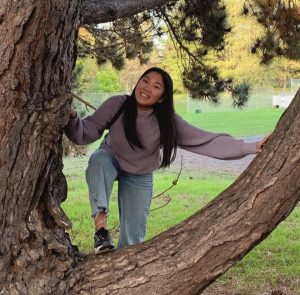
Eleanor Cheung
Student at Simon Fraser University

Thank you for the staff workers
Thank you for loving them and walking with them their entire lives
Even when they didn’t know you or trust you and when they didn’t have hope in themselves
You’ve known them their whole lives and you’ve always had hope for them
Thank you for placing each one of them on campuses
And entrusting them with your kingdom in different spaces
Thank you for our staff worker’s diverse backgrounds, educations, dreams, emotions, personalities, strengths, and weaknesses,
all uniquely informing their experiences with you
I pray their knowledge of your love is so rich with experience
And also, ever changing as they meet you again and again
And I pray that they can fully share this love as they care for all the different student they meet
Thursday, March 24
Cristyn Bergen
Campus Staff in Prince George
You have called us into life my Christ, to be known and loved by you
Give them the eyes to see the mystery of your words O Christ.
“That eternal life is this [these students/staff] may know you the only true
God, and Jesus Christ whom you have sent.”
O Merciful Saviour, would you teach us the steps of the waltz you took part in on earth?
Father, Son and Holy Spirit, three in one.
Help us to understand the mystery of this communion.
Invite them into the dance of the Trinity.
You were known by the Father,
You followed the steps of the Spirit,
Show us the way to know
When the wounds from others fester the old lies that they are unlovable,
you call them to be known, even with the pains of the past they keep hidden.
When they wear their mask in your meeting place
and words their heart doubts sing across their lips,
Help them to believe, you look beyond their mask
and pursue what lies underneath.
And when the world laughs when we make fools of ourselves walking down this pilgrim way
Give [students/staff] the humility and humour
To fall on the grace that first brought them to you
And the joy that there is nothing to fear when they are known by you

Cristyn Bergen
Campus Staff in Prince George

You have called us into life my Christ, to be known and loved by you
Give them the eyes to see the mystery of your words O Christ.
“That eternal life is this [these students/staff] may know you the only true
God, and Jesus Christ whom you have sent.”
O Merciful Saviour, would you teach us the steps of the waltz you took part in on earth?
Father, Son and Holy Spirit, three in one.
Help us to understand the mystery of this communion.
Invite them into the dance of the Trinity.
You were known by the Father,
You followed the steps of the Spirit,
Show us the way to know
When the wounds from others fester the old lies that they are unlovable,
you call them to be known, even with the pains of the past they keep hidden.
When they wear their mask in your meeting place
and words their heart doubts sing across their lips,
Help them to believe, you look beyond their mask
and pursue what lies underneath.
And when the world laughs when we make fools of ourselves walking down this pilgrim way
Give [students/staff] the humility and humour
To fall on the grace that first brought them to you
And the joy that there is nothing to fear when they are known by you
Friday, March 25
Laetare Sunday
Alan Thorimbert
Campus Staff, University of Victoria
O how very strongly we want to change the world
reach the stars and space beyond,
but sometimes when our dreams are so big,
we fail to notice that we’re climbing towers of Babel
rather than the mountains of God.
O Rejoice, then, O People of God
the Kingdom of God is like a mustard seed
and multitudes are fed with five fish and two loves
what is small might be greater,
what is vast might be dangerous,
what is forgotten might be a crown in heaven,
what is remembered might be an atrocity beyond reach.
all might be upside down, outside in.
Today, we celebrate what is low
today, we rejoice in what is middling.
we listen for the small epiphanies and little acts of love
for mercy is greater than justice,
We know the journey is but halfway,
but we are learning that there is more grace than we could dream of in our Shepherd’s hands.
for the cricket grace of God
has crept by into the hearth
without the farmer’s knowing
what a secret joy
for the wife to uncover
that the songs of light come in many sizes
still is the voice of thunderous adoration
Oracle between the blades of grass
where the pearl of great price, lies hidden and waiting.
Jesus’ Prayer in the Garden
Monday, March 28
Katharine Beaven
Adventure Camp Director Pioneer Ontario
Matthew 26:36-46
My Soul is Very Sorrowful
This beautiful stained glass is at the front of the church I attended growing up. For over two decades I stared at it, noticing all its detail. I read the words over and over and often wondered why Ms. Lillian had chosen this window in memory of her husband. It was present during sermons, baptisms, pageants, youth worship nights, weddings, and funerals. I saw it with bright smiles and blurred through tears. I sometimes wonder if this window is the reason I relate most to the moments Jesus spent in the garden.
Losing my mum at age 10 sent me into a spiral of turmoil. My thoughts of suicide started then and lasted more than a decade. I would read Psalm 6 and 34 over and over. I took comfort that David put words to the anguish I was feeling. Then I discovered Max Lucado’s book about Jesus’ last week and the chapter ‘He Chose You.’ Lucado’s re-telling of Jesus’ experience in Gethsemane opened my eyes to the Jesus who also felt anguish and turmoil. Jesus realized what the coming days would bring, and “he was sorrowful and troubled.” He took his three closest disciples to pray. Twice he found them sleeping. Three times he asked if there could be another way. Three times he saw what lay ahead, and his grief was overwhelming. But three times he ended his plea with “not my will but yours.” Three times he saw us and chose us. Three times his love for us was so great that he submitted to the Father.
Reflect: During this Lenten season, let us remember that Jesus has felt anguish and abandonment. He has felt the deep sorrow of loss and lack of care from friends. He has felt all of these big feels, but with big love he saw you, heard you, wanted you and took the punishment for you. He chose us so we can have freedom in him.

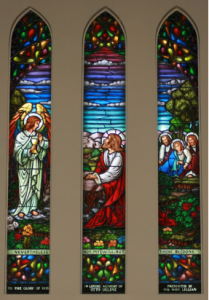
Katharine Beaven
Adventure Camp Director Pioneer Ontario

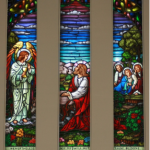
Matthew 26:36-46
My Soul is Very Sorrowful
This beautiful stained glass is at the front of the church I attended growing up. For over two decades I stared at it, noticing all its detail. I read the words over and over and often wondered why Ms. Lillian had chosen this window in memory of her husband. It was present during sermons, baptisms, pageants, youth worship nights, weddings, and funerals. I saw it with bright smiles and blurred through tears. I sometimes wonder if this window is the reason I relate most to the moments Jesus spent in the garden.
Losing my mum at age 10 sent me into a spiral of turmoil. My thoughts of suicide started then and lasted more than a decade. I would read Psalm 6 and 34 over and over. I took comfort that David put words to the anguish I was feeling. Then I discovered Max Lucado’s book about Jesus’ last week and the chapter ‘He Chose You.’ Lucado’s re-telling of Jesus’ experience in Gethsemane opened my eyes to the Jesus who also felt anguish and turmoil. Jesus realized what the coming days would bring, and “he was sorrowful and troubled.” He took his three closest disciples to pray. Twice he found them sleeping. Three times he asked if there could be another way. Three times he saw what lay ahead, and his grief was overwhelming. But three times he ended his plea with “not my will but yours.” Three times he saw us and chose us. Three times his love for us was so great that he submitted to the Father.
Reflect: During this Lenten season, let us remember that Jesus has felt anguish and abandonment. He has felt the deep sorrow of loss and lack of care from friends. He has felt all of these big feels, but with big love he saw you, heard you, wanted you and took the punishment for you. He chose us so we can have freedom in him.
Tuesday, March 29
https://youtu.be/cnOG5uwvdgY
A friend shared this with me when it first came out over 20 years ago. I was still struggling with thoughts of suicide and dealing with many broken relationships. I would listen to the song repeatedly so the words would saturate my mind. Unlike me, Jesus knew exactly why he had to go through what he did. As you listen remember that Jesus has been there, and he chose you.
Yet I Will Praise
I will praise You Lord my God
Even in my brokenness
I will praise You Lord
I will praise You Lord my God
Even in my desperation
I will praise You Lord
And I can’t understand
All that You allow
I just can’t see the reason
But my life is in Your hands
And though I cannot see You
I choose to trust You
Even when my heart is torn I will praise (trust) You Lord
Even when I feel deserted I will praise (trust) You Lord
Even in my darkest valley I will praise (trust) You Lord
And when my world is shattered
And it seems all hope is gone
Yet I will praise You Lord
I will trust You Lord my God
Even in my loneliness
I will trust You Lord
I will trust You Lord my God
Even when I cannot hear You
I will trust You Lord
And I will not forget
That You hung on a cross
Lord You bled and died for me
And if I have to suffer
I know that You’ve been there
And I know that You’re here now
Written by: Andy Park
CCLI#3033258 ©1999 Vineyard Songs (Canada). Admin. by Mercy/Vineyard Publishing in the US. (ASCAP) All Rights Reserved. International Copyright Secured. Used By Permission.
Wednesday, March 30
Austin Fedchuk
Campus Minister University of British Columbia
Psalm 23, Matt 20, John 4 & Matt 26
This is a reflection on the imagined thoughts of some of Jesus’ early followers around the cup that Jesus will drink referencing
There is a cup in my hands but it’s empty. I’m ready for your promises. David wrote that you anointed his head with oil and that his cup overflowed. There is a cup in my hands but it’s empty.
I have said yes. I have followed you. I long to sit at your right hand in glory. You ask if I can drink the cup you are going to drink. I say yes. There is a cup in my hands but it’s empty.
I remember when we went through Samaria. You asked that woman for a drink. What were we supposed to think? You told her she should have asked you for a drink. But you didn’t have a cup, and the well was deep. You told her you had living water. She ran back to her village in joy. I grabbed her cup in my hands, but it’s empty.
We entered the city for Passover. We ate supper in a leper’s home. Another woman came in with a full jar of perfume. She poured it on your head, the whole room was upset. You honoured her saying she will always be remembered. I remember her and the cup in her hand, and it’s empty.
We are upstairs in a room. The Passover is soon. You wash our feet before we eat. We celebrate, but I sense doom. After the bread you give us the cup. You tell us to drink and that you will be poured out for many, I take the cup in my hands and drink until it is empty.
We go to a garden. My mind is still spinning but I can’t say why. You look so troubled as if you are about to cry. You instruct me to stay and keep watch with you but I’m too tired to stand, so I drift off to sleep with this empty cup in my hand.
I am startled awake. Your face looks so bleak. I am concerned for you, my friend, but I can’t speak. You tell us to pray because our flesh is weak. As I drift off again, you mention a cup. I dream that you cry out “Abba Father, not my will but your will, though I am asking you still, must I drink my fill on the tree on that hill?” You look sad. You look tired.
I dream another dream. In it I approach you sitting by a fire on a hill. I sit down next to you. I am sad, I am tired. I ask you about this season I am in and what I am holding. I look down and there is a cup in my hand, but it’s empty. You take the cup from my hand and put it beside you. You put your hand in mine and as we look out over the rolling hills, we both drink our fill.
This last verse is an image Jesus gave me recently in prayer. The image of the cup reminded me of Jesus’ prayer to the Father. He knew what was in his cup, he knew what God was asking him and he still asked the Father about it. Repeatedly in fact. There was conversation, there was vulnerability and honesty.
I find it hard to come to God in vulnerability and honesty, but that’s exactly what Jesus did. Jesus wants us to do the same. Join me in talking to Jesus.
Prayer: Close your eyes and imagine going to meet Jesus somewhere. Maybe it’s in a garden, by a fire on a hill, by the water or a forest in the mountains. Imagine meeting the Creator in creation.
Take deep, slow breaths, and close your eyes. Imagine going to Jesus where he sits. Sit beside him. How do you feel? Look down in your hands and imagine you are holding a cup. What is inside of it? Ask Jesus about what is in your cup. What does he say? Ask Jesus for a drink. What does he give you?

Austin Fedchuck
Campus Minister University of British Columbia

Psalm 23, Matt 20, John 4 & Matt 26
This is a reflection on the imagined thoughts of some of Jesus’ early followers around the cup that Jesus will drink referencing
There is a cup in my hands but it’s empty. I’m ready for your promises. David wrote that you anointed his head with oil and that his cup overflowed. There is a cup in my hands but it’s empty.
I have said yes. I have followed you. I long to sit at your right hand in glory. You ask if I can drink the cup you are going to drink. I say yes. There is a cup in my hands but it’s empty.
I remember when we went through Samaria. You asked that woman for a drink. What were we supposed to think? You told her she should have asked you for a drink. But you didn’t have a cup, and the well was deep. You told her you had living water. She ran back to her village in joy. I grabbed her cup in my hands, but it’s empty.
We entered the city for Passover. We ate supper in a leper’s home. Another woman came in with a full jar of perfume. She poured it on your head, the whole room was upset. You honoured her saying she will always be remembered. I remember her and the cup in her hand, and it’s empty.
We are upstairs in a room. The Passover is soon. You wash our feet before we eat. We celebrate, but I sense doom. After the bread you give us the cup. You tell us to drink and that you will be poured out for many, I take the cup in my hands and drink until it is empty.
We go to a garden. My mind is still spinning but I can’t say why. You look so troubled as if you are about to cry. You instruct me to stay and keep watch with you but I’m too tired to stand, so I drift off to sleep with this empty cup in my hand.
I am startled awake. Your face looks so bleak. I am concerned for you, my friend, but I can’t speak. You tell us to pray because our flesh is weak. As I drift off again, you mention a cup. I dream that you cry out “Abba Father, not my will but your will, though I am asking you still, must I drink my fill on the tree on that hill?” You look sad. You look tired.
I dream another dream. In it I approach you sitting by a fire on a hill. I sit down next to you. I am sad, I am tired. I ask you about this season I am in and what I am holding. I look down and there is a cup in my hand, but it’s empty. You take the cup from my hand and put it beside you. You put your hand in mine and as we look out over the rolling hills, we both drink our fill.
This last verse is an image Jesus gave me recently in prayer. The image of the cup reminded me of Jesus’ prayer to the Father. He knew what was in his cup, he knew what God was asking him and he still asked the Father about it. Repeatedly in fact. There was conversation, there was vulnerability and honesty.
I find it hard to come to God in vulnerability and honesty, but that’s exactly what Jesus did. Jesus wants us to do the same. Join me in talking to Jesus.
Prayer: Close your eyes and imagine going to meet Jesus somewhere. Maybe it’s in a garden, by a fire on a hill, by the water or a forest in the mountains. Imagine meeting the Creator in creation.
Take deep, slow breaths, and close your eyes. Imagine going to Jesus where he sits. Sit beside him. How do you feel? Look down in your hands and imagine you are holding a cup. What is inside of it? Ask Jesus about what is in your cup. What does he say? Ask Jesus for a drink. What does he give you?
Thursday, March 31
Mark 14:32-42
Can you imagine Jesus inviting you to stay with him as he prays in Gethsemane? Today, for what or for whom might Jesus be praying with great sorrow? For what or for whom are you praying? Ask the Spirit of Jesus to help you stay awake as you pray for what concerns you both today.
Friday, April 1
Jesus is Betrayed
Monday, April 4
Daiane Alecrim
Accountant
1 Corinthians 11:23-24
“For I received from the Lord what I also passed on to you; The Lord Jesus, on the night he was betrayed, took bread, and when he had given thanks, he broke it and said, This is my body, which is for you; do this in remembrance of me.”
This passage is often read when we take holy communion in our churches. Jesus reminded us then, as he does now, of the night when he was betrayed. This reveals so much about Jesus’ character. One of his closest friends Judas, his trusted follower of three years, was about to betray Jesus for money. And yet Jesus does not expose Judas or make a scene. Jesus shares bread with him, offers him himself.
I wonder what we would do in Jesus’ place. I remember some very difficult times in my life when I was pregnant and hoping to give birth to my child. Instead, seven years ago I miscarried and lost that baby. My pain felt like a rock inside me – no feelings. I just kept pretending that I was OK. The second time, just one year ago, was different. When I lost our second baby, I felt betrayed by life, by God, by my body. There was another woman in hospital with me. She didn’t know I had lost my baby, and she asked me to pray for her. I felt love for her and somehow God helped me to pray for her. Looking back now I can see that giving to others when we feel betrayed is an act of love that only God can give. After that time, I began asking God questions. I needed answers for this suffering. I went to church and the pastor who was supposed to preach was not able to come that day. Another woman at the last minute stepped in and preached a wonderful sermon about Hannah and her grief in the temple, crying for a child (1 Samuel 1). Her words spoke directly to my heart. Since then, I have been growing in my faith and trust that God is good and is always with us. God led me to work at InterVarsity and is giving me opportunities to encourage others. When I take holy communion, I remember the great love that Jesus offers even when he is being betrayed.
Reflect: When have you felt betrayed by God, by life, by friends? Talk with Jesus about that experience and see what comes to mind. Jesus understands how you feel. Ask Jesus that his love would heal your heart.

Daiane Alecrim
Accountant

1 Corinthians 11:23-24
“For I received from the Lord what I also passed on to you; The Lord Jesus, on the night he was betrayed, took bread, and when he had given thanks, he broke it and said, This is my body, which is for you; do this in remembrance of me.”
This passage is often read when we take holy communion in our churches. Jesus reminded us then, as he does now, of the night when he was betrayed. This reveals so much about Jesus’ character. One of his closest friends Judas, his trusted follower of three years, was about to betray Jesus for money. And yet Jesus does not expose Judas or make a scene. Jesus shares bread with him, offers him himself.
I wonder what we would do in Jesus’ place. I remember some very difficult times in my life when I was pregnant and hoping to give birth to my child. Instead, seven years ago I miscarried and lost that baby. My pain felt like a rock inside me – no feelings. I just kept pretending that I was OK. The second time, just one year ago, was different. When I lost our second baby, I felt betrayed by life, by God, by my body. There was another woman in hospital with me. She didn’t know I had lost my baby, and she asked me to pray for her. I felt love for her and somehow God helped me to pray for her. Looking back now I can see that giving to others when we feel betrayed is an act of love that only God can give. After that time, I began asking God questions. I needed answers for this suffering. I went to church and the pastor who was supposed to preach was not able to come that day. Another woman at the last minute stepped in and preached a wonderful sermon about Hannah and her grief in the temple, crying for a child (1 Samuel 1). Her words spoke directly to my heart. Since then, I have been growing in my faith and trust that God is good and is always with us. God led me to work at InterVarsity and is giving me opportunities to encourage others. When I take holy communion, I remember the great love that Jesus offers even when he is being betrayed.
Reflect: When have you felt betrayed by God, by life, by friends? Talk with Jesus about that experience and see what comes to mind. Jesus understands how you feel. Ask Jesus that his love would heal your heart.
Tuesday, April 5
Scripture:
1 Corinthians 11:23-24
“For I received from the Lord what I also passed on to you; The Lord Jesus, on the night he was betrayed, took bread, and when he had given thanks, he broke it and said, This is my body, which is for you; do this in remembrance of me.”
This passage is often read when we take holy communion in our churches. Jesus reminded us then, as he does now, of the night when he was betrayed. This reveals so much about Jesus’ character. One of his closest friends Judas, his trusted follower of three years, was about to betray Jesus for money. And yet Jesus does not expose Judas or make a scene. Jesus shares bread with him, offers him himself.
I wonder what we would do in Jesus’ place. I remember some very difficult times in my life when I was pregnant and hoping to give birth to my child. Instead, seven years ago I miscarried and lost that baby. My pain felt like a rock inside me – no feelings. I just kept pretending that I was OK. The second time, just one year ago, was different. When I lost our second baby, I felt betrayed by life, by God, by my body. There was another woman in hospital with me. She didn’t know I had lost my baby, and she asked me to pray for her. I felt love for her and somehow God helped me to pray for her. Looking back now I can see that giving to others when we feel betrayed is an act of love that only God can give. After that time, I began asking God questions. I needed answers for this suffering. I went to church and the pastor who was supposed to preach was not able to come that day. Another woman at the last minute stepped in and preached a wonderful sermon about Hannah and her grief in the temple, crying for a child (1 Samuel 1). Her words spoke directly to my heart. Since then, I have been growing in my faith and trust that God is good and is always with us. God led me to work at InterVarsity and is giving me opportunities to encourage others. When I take holy communion, I remember the great love that Jesus offers even when he is being betrayed.
Reflect: When have you felt betrayed by God, by life, by friends? Talk with Jesus about that experience and see what comes to mind. Jesus understands how you feel. Ask Jesus that his love would heal your heart.
Wednesday, April 6
Rachelle Low
Saskatchewan Director
Mark 14:45-46
“Speaks Well Of (Judas), when he arrived, walked right up to Creator Sets Free (Jesus). “Wisdomkeeper!” he said, and then kissed him. They moved in and took hold of Creator Sets Free (Jesus) to arrest him.”
Matthew 26:49-50
“Speaks Well Of (Judas) walked right up to Creator Sets Free (Jesus). “Greetings, Wisdomkeeper,” he said and then kissed him. “My friend,” Creator Sets Free (Jesus) said to his face, “Do what you came to do.” The crowd moved in and took hold of Creator Sets Free (Jesus) to arrest him.”
Have you paused to wonder what Jesus felt when Judas betrayed him in the garden? Is there a personal experience that leaps to mind when you read the story of Judas’ betrayal of Jesus?
I have stories, too many to count, of betrayals in my own life. To hold the pain at bay, I have disconnected my feelings and emotions from those experiences. Over time, however, painful experiences have become solidly lodged in my memory like unwanted sculptures that haunt me day and night.
I picture Jesus in the garden, knowing that the cross is still before him, as he watches one of his closest friends draw close. The betrayal must have felt painful, weighty, and deeply wounding. Perhaps the betrayal was heavier and more painful than the thought of death on the cross.
I disconnected myself from my feelings and emotions, but I wonder if Jesus fully embraced his. I thought that by disconnecting from my emotions and feelings I could keep myself safe from future pain. Instead, I am beginning to wonder if perhaps I was only betraying myself over and over again.
I return to the moment in that garden; I stand next to Jesus. As I watch Judas approach Jesus, I sense deep love and longing radiating forth from Jesus towards Judas. I feel the moment Jesus’ heart shattered into a thousand pieces. I wonder about the sorrow in Jesus’ heart. Judas drew close and kissed Jesus, an intimate act that ought to have been followed by an embrace and the resolidifying of deepened trust. Yet the opposite is true: his intimate act opened a chasm that haunted Judas until his death.
Jesus responded to Judas’ betrayal with permission: he allowed the crowd to arrest him. He affectionally whispered “my friend” to Judas, a term that feels so familiar and cherished, so loving and so free of conditions and expectations. Even while being betrayed, Jesus gifted Judas with his emotions. Even at the height of great pain, Jesus allowed himself to experience the gifts of divinity and humanity: pain mingled with love, betrayal mingled with loyalty. And so the betrayal did not haunt Jesus as betrayal haunted Judas and me.
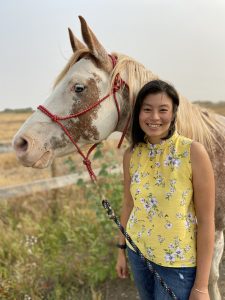
Rachelle Low
Saskatchewan Director

Mark 14:45-46
“Speaks Well Of (Judas), when he arrived, walked right up to Creator Sets Free (Jesus). “Wisdomkeeper!” he said, and then kissed him. They moved in and took hold of Creator Sets Free (Jesus) to arrest him.”
Matthew 26:49-50
“Speaks Well Of (Judas) walked right up to Creator Sets Free (Jesus). “Greetings, Wisdomkeeper,” he said and then kissed him. “My friend,” Creator Sets Free (Jesus) said to his face, “Do what you came to do.” The crowd moved in and took hold of Creator Sets Free (Jesus) to arrest him.”
Have you paused to wonder what Jesus felt when Judas betrayed him in the garden? Is there a personal experience that leaps to mind when you read the story of Judas’ betrayal of Jesus?
I have stories, too many to count, of betrayals in my own life. To hold the pain at bay, I have disconnected my feelings and emotions from those experiences. Over time, however, painful experiences have become solidly lodged in my memory like unwanted sculptures that haunt me day and night.
I picture Jesus in the garden, knowing that the cross is still before him, as he watches one of his closest friends draw close. The betrayal must have felt painful, weighty, and deeply wounding. Perhaps the betrayal was heavier and more painful than the thought of death on the cross.
I disconnected myself from my feelings and emotions, but I wonder if Jesus fully embraced his. I thought that by disconnecting from my emotions and feelings I could keep myself safe from future pain. Instead, I am beginning to wonder if perhaps I was only betraying myself over and over again.
I return to the moment in that garden; I stand next to Jesus. As I watch Judas approach Jesus, I sense deep love and longing radiating forth from Jesus towards Judas. I feel the moment Jesus’ heart shattered into a thousand pieces. I wonder about the sorrow in Jesus’ heart. Judas drew close and kissed Jesus, an intimate act that ought to have been followed by an embrace and the resolidifying of deepened trust. Yet the opposite is true: his intimate act opened a chasm that haunted Judas until his death.
Jesus responded to Judas’ betrayal with permission: he allowed the crowd to arrest him. He affectionally whispered “my friend” to Judas, a term that feels so familiar and cherished, so loving and so free of conditions and expectations. Even while being betrayed, Jesus gifted Judas with his emotions. Even at the height of great pain, Jesus allowed himself to experience the gifts of divinity and humanity: pain mingled with love, betrayal mingled with loyalty. And so the betrayal did not haunt Jesus as betrayal haunted Judas and me.
Thursday, April 7
Reflect: Take time today to read the passage below:
“Right then, while Creator Sets Free (Jesus) was speaking, a crowd of people stormed into the garden. Speaks Well Of (Judas), one of the twelve, was leading the way. Along with the betrayer came the large crowd, sent from the head holy men and elders of the tribal council, carrying clubs and long knives. [The air was filled with the smell of burning torches as the crowd pushed their way forward.] The betrayer had given them a sign. “Take hold of the one I greet with a kiss, and arrest him.” Speaks Well Of (Judas) walked right up to Creator Sets Free (Jesus). “Greetings, Wisdomkeeper,” he said and then kissed him. “My friend,” Creator Sets Free
(Jesus) said to his face, “Do what you came to do.” The crowd moved in and took hold of Creator Sets Free (Jesus) to arrest him.” (Matthew 26: 47-50; First Nations Version)
Picture yourself in that scene next to Jesus. Pay attention to emotions and feelings that you experience as you interact with the scene. What are those emotions and feelings? Name those emotions and feelings. Sit with them.
Friday, April 8
Reflect: Where in your life have you experienced betrayal? How did you respond to that experience of betrayal? Bring that experience to Jesus. Invite Jesus into that experience. Ask him if there is something he would like to reveal or say to you regarding that experience.
Palm Sunday
Palm Sunday – Alan Thorimbert
To the mountain of the Master
we climb, we ascend, we veer into his palms
where the air is lighter and the bread of the wind
hovers in a pillar of cloud.
To the mountain of the Master
where obedience becomes less of a rulebook
and more of a challenge to find a new ledge
a new footing, strong that sea-side beaches
To the mountain of the Master
where we step into a thin place
flagrant and fragrance, sacrifice and sacristy
now you are the incense rising up
To the mountain of the Master
later poets shall call this a place of kingship
but for a moment you’re a walking prayer
say what you will to the Creator-listening
to the mountain of the Master
past the towering of the lions and the bridges
in the dusk of the ascent of veritas
sing the hymn of truth and spirit, friend.
To the mountain of the Lord
where the shortened days refuse to be quicksand
cherubim, many eyed, many soared, signified
hold themselves aloft, let the chariots take us forth
Jesus on Trial
Monday, April 11
Aaron Husband
Campus Minister Concordia University
Matthew 26:57-27:31
I still remember the first time I realized how much of a farce Jesus’ trial was. I grew up going to church, hearing this story my whole life. But it was only when studying Scripture with university students, that it truly hit me. The trial was a joke, the worst kind. How many legitimate trials take place in the middle of the night? How many have false witnesses, probably bribed (and rather incompetent)? Jesus’ persecutors were too cowardly to arrest him in public. Pilate was not innocent. His handwashing was no absolution. Everyone betrayed Jesus, not just Peter. Calling it a trial gives it too much legitimacy. I remember my blood starting to boil. I remember tears welling in my eyes. I remember wanting to punch a wall. How could they have so much pride! How could they fail to see reason! How could they act like such animals!
But Jesus wasn’t being pushed around. He knew what he was doing. When Jesus responded to the high priest in Matthew 26:64, he was referencing Daniel 7, where Daniel has a vision of someone called “the Son of Man” (which just means “a human”), except Jesus is no ordinary human! He’s been given God’s kingly authority and is described with divine attributes. This scene of the Son of Man comes directly after great beasts – which we later realize are symbols of terrible nations which wreak injustices – are trampling the world, but God stops their evil and pronounces judgement on them, raising the Son of Man. Daniel 7 is a court scene. Jesus was saying, in effect, that he would be crowned King and judge their beastly ways that very day.
Two trials took place that day. A legitimate one and a false one.
It’s easy for me to participate in the false one, becoming like a beast, pridefully and pathetically grasping for false power while pretending to be innocent. Even as I am justly angry at those who mistreated Jesus, I know I would have either done the same in their position or mistreated them back – that is to say, I would have done the same in their position.
But Jesus was the truly human one, the type of human we all ought to be. And with the authority and freedom that comes with being a king, he used his true power – power as humans ought to use it – with ultimate humility, allowing himself to be judged, though he was the judge; all this so our beastliness can be condemned without our rightful condemnation. In doing so, he made a way for us to be as humans are designed to be, free from the chains of beastly ways, full of love, joy, peace, patience, kindness, goodness, faithfulness, gentleness, and self-control.
That trial was not a farce. Praise God.
Reflect: How do you respond to the contrast between the two trials taking place? What do the trials say about the character and Kingdom of God? When do you participate in the false trial, and how is Jesus inviting you into a better way?

Aaron Husband
Campus Minister Concordia University

Matthew 26:57-27:31
I still remember the first time I realized how much of a farce Jesus’ trial was. I grew up going to church, hearing this story my whole life. But it was only when studying Scripture with university students, that it truly hit me. The trial was a joke, the worst kind. How many legitimate trials take place in the middle of the night? How many have false witnesses, probably bribed (and rather incompetent)? Jesus’ persecutors were too cowardly to arrest him in public. Pilate was not innocent. His handwashing was no absolution. Everyone betrayed Jesus, not just Peter. Calling it a trial gives it too much legitimacy. I remember my blood starting to boil. I remember tears welling in my eyes. I remember wanting to punch a wall. How could they have so much pride! How could they fail to see reason! How could they act like such animals!
But Jesus wasn’t being pushed around. He knew what he was doing. When Jesus responded to the high priest in Matthew 26:64, he was referencing Daniel 7, where Daniel has a vision of someone called “the Son of Man” (which just means “a human”), except Jesus is no ordinary human! He’s been given God’s kingly authority and is described with divine attributes. This scene of the Son of Man comes directly after great beasts – which we later realize are symbols of terrible nations which wreak injustices – are trampling the world, but God stops their evil and pronounces judgement on them, raising the Son of Man. Daniel 7 is a court scene. Jesus was saying, in effect, that he would be crowned King and judge their beastly ways that very day.
Two trials took place that day. A legitimate one and a false one.
It’s easy for me to participate in the false one, becoming like a beast, pridefully and pathetically grasping for false power while pretending to be innocent. Even as I am justly angry at those who mistreated Jesus, I know I would have either done the same in their position or mistreated them back – that is to say, I would have done the same in their position.
But Jesus was the truly human one, the type of human we all ought to be. And with the authority and freedom that comes with being a king, he used his true power – power as humans ought to use it – with ultimate humility, allowing himself to be judged, though he was the judge; all this so our beastliness can be condemned without our rightful condemnation. In doing so, he made a way for us to be as humans are designed to be, free from the chains of beastly ways, full of love, joy, peace, patience, kindness, goodness, faithfulness, gentleness, and self-control.
That trial was not a farce. Praise God.
Reflect: How do you respond to the contrast between the two trials taking place? What do the trials say about the character and Kingdom of God? When do you participate in the false trial, and how is Jesus inviting you into a better way?
Tuesday, April 12
Today take some time to enjoy the music of The Corner Room, one of my favorite bands. Enjoy their rendition of Isaiah 52- 53 and be with Jesus on trial.
Wednesday, April 13
Scripture:
Matthew 27:19-21
Reflect: How do you respond when your good advice is not heeded or when decisions do not go in your favour? Pilate’s wife begged Pilate not to judge Jesus, and Pilate, hoping for a way out, offered the people a choice between Barabbas and Jesus. Ask Jesus to help you find his grace as you wrestle with bad decisions.
Thursday, April 14
Jamie MacArthur
Atlantic Director
Mark 15
Reflect: Ask God to give light to your darkness, by his Holy Spirit. Jesus, the Word of God, who was with God in the beginning, has much to teach us all. Yet, in the presence of Pilate and those assembled, he did not answer his accusers, but kept silent. Why might this be? What can we learn from his example? How and when might keeping silent be both hard for us, and beneficial to those around us?
In verses 6-14 Pilate, convinced of Jesus’ innocence, tries to release him. The people, however, are bent on crucifixion and demand this horrific death for the sinless Saviour. They do not argue against Pilate’s point, that Jesus has done nothing wrong. They simply scream “Crucify him!”
Are you ever like this, unreasonable and without mercy, even though God has shown grace and mercy to you? Take a moment to repent of any hard-heartedness God may reveal in you, and turn your mind and your heart back to the merciful ways of the God. Choose to extend mercy to others: strangers, enemies, estranged brothers and sisters, and, perhaps most challenging, to yourself.
Pilate wanted to set Jesus free. He admired this prophet and marvelled at his wisdom, but because his own leadership felt precarious, Pilate leaned into the will of the people, making a political calculation, rather than taking an ethical stand.
May God help all of us, especially those of us who lead, and may he grant us the grace and wisdom to acknowledge interpersonal politics at work in us, our temptation to solidify our own position, rather than to do what is right, regardless of the consequences.
Ask God to help you follow the way of Jesus. May he receive all the glory and praise for everything we do, as we follow him with the strength God provides. Amen.

Jamie MacArthur
Atlantic Director

Mark 15
Reflect: Ask God to give light to your darkness, by his Holy Spirit. Jesus, the Word of God, who was with God in the beginning, has much to teach us all. Yet, in the presence of Pilate and those assembled, he did not answer his accusers, but kept silent. Why might this be? What can we learn from his example? How and when might keeping silent be both hard for us, and beneficial to those around us?
In verses 6-14 Pilate, convinced of Jesus’ innocence, tries to release him. The people, however, are bent on crucifixion and demand this horrific death for the sinless Saviour. They do not argue against Pilate’s point, that Jesus has done nothing wrong. They simply scream “Crucify him!”
Are you ever like this, unreasonable and without mercy, even though God has shown grace and mercy to you? Take a moment to repent of any hard-heartedness God may reveal in you, and turn your mind and your heart back to the merciful ways of the God. Choose to extend mercy to others: strangers, enemies, estranged brothers and sisters, and, perhaps most challenging, to yourself.
Pilate wanted to set Jesus free. He admired this prophet and marvelled at his wisdom, but because his own leadership felt precarious, Pilate leaned into the will of the people, making a political calculation, rather than taking an ethical stand.
May God help all of us, especially those of us who lead, and may he grant us the grace and wisdom to acknowledge interpersonal politics at work in us, our temptation to solidify our own position, rather than to do what is right, regardless of the consequences.
Ask God to help you follow the way of Jesus. May he receive all the glory and praise for everything we do, as we follow him with the strength God provides. Amen.
Good Friday
Jamie MacArthur
Atlantic Director
Mark 15:21-41
The gospel of Mark describes the events of the day we now call “Good Friday” in simple, stark language. Now the Passover and the Festival of Unleavened Bread were only two days away, and the chief priests and the teachers of the law were scheming to arrest Jesus secretly and kill him. “But not during the festival,” they said, “or the people may riot.” Mark 14:1-2
In chapter 15, these shocking and evil thoughts of the teachers of the law have moved from harmful intent to violent action, all against the backdrop of religious festivals designed to highlight God’s deliverance and mercy toward His people! Dark things lurk in the hearts of all people, at least at times, and the darker life gets, the darkness in our thoughts, attitudes, and plans becomes more obvious. In the darkness and isolation caused by COVID-19, perhaps you have witnessed a tendency in yourself to lean into problematic thoughts and actions. On one hand, it is important not to condemn yourself harshly for thinking the kinds of things all of us are tempted to think. On the other hand, God’s heart and word are the measure of what is good, so we mustn’t excuse our attitudes and actions just because they are common to human experience. God offers forgiveness for all our sins through the death of his Son, Jesus, on the cross. Jesus’ death was necessary because of sin, and yet our sin is removed when we accept Jesus’ sacrifice for our sin, his death in our place, and his forgiveness. Praise God!
Dark thoughts, jealousy, lust for power, insecurity, and other mundane elements of human nature led to unjustified hatred and the ultimate persecution and killing of God’s sinless Son, Israel’s Messiah, our Lord and Saviour Jesus Christ! Likewise, our thoughts about sinful, imperfect others can lead to terrible and terrifying judgments, condemnation, suffering and death for our fellow humans.
As I write this, there is so much darkness rising up, not just out there in our world, but here inside each of us, and no one should be calling it light. We can never call our hatred “Christian.” Nothing about pride and ambition follow in the footsteps of Jesus, “who, having been made in human likeness did not consider equality with God as something to be grasped, but made himself nothing, taking the very form of a servant.” Phil.2
Reflect: Stand at the cross and be with Jesus. Talk with him about whatever is dark and light within you. Receive his mercy and grace.

Jamie MacArthur
Atlantic Director

Mark 15:21-41
The gospel of Mark describes the events of the day we now call “Good Friday” in simple, stark language. Now the Passover and the Festival of Unleavened Bread were only two days away, and the chief priests and the teachers of the law were scheming to arrest Jesus secretly and kill him. “But not during the festival,” they said, “or the people may riot.” Mark 14:1-2
In chapter 15, these shocking and evil thoughts of the teachers of the law have moved from harmful intent to violent action, all against the backdrop of religious festivals designed to highlight God’s deliverance and mercy toward His people! Dark things lurk in the hearts of all people, at least at times, and the darker life gets, the darkness in our thoughts, attitudes, and plans becomes more obvious. In the darkness and isolation caused by COVID-19, perhaps you have witnessed a tendency in yourself to lean into problematic thoughts and actions. On one hand, it is important not to condemn yourself harshly for thinking the kinds of things all of us are tempted to think. On the other hand, God’s heart and word are the measure of what is good, so we mustn’t excuse our attitudes and actions just because they are common to human experience. God offers forgiveness for all our sins through the death of his Son, Jesus, on the cross. Jesus’ death was necessary because of sin, and yet our sin is removed when we accept Jesus’ sacrifice for our sin, his death in our place, and his forgiveness. Praise God!
Dark thoughts, jealousy, lust for power, insecurity, and other mundane elements of human nature led to unjustified hatred and the ultimate persecution and killing of God’s sinless Son, Israel’s Messiah, our Lord and Saviour Jesus Christ! Likewise, our thoughts about sinful, imperfect others can lead to terrible and terrifying judgments, condemnation, suffering and death for our fellow humans.
As I write this, there is so much darkness rising up, not just out there in our world, but here inside each of us, and no one should be calling it light. We can never call our hatred “Christian.” Nothing about pride and ambition follow in the footsteps of Jesus, “who, having been made in human likeness did not consider equality with God as something to be grasped, but made himself nothing, taking the very form of a servant.” Phil.2
Reflect: Stand at the cross and be with Jesus. Talk with him about whatever is dark and light within you. Receive his mercy and grace.
Easter Saturday
Dave Nguyen-Stone
British Columbia Director
John 19.25b-42
Will I See You Again?
Our doorbell rang at the worst possible time on a late April morning. My hand shook as I opened the door and struggled to maintain composure. A friend’s father had come to pick up a package of cloth diapers for his first grandchild. We shared small talk for a moment, but the ridiculousness of the present situation was too much. When he asked how I was doing, I obliged: “Well, I just got a phone call saying that my nephew passed away…” How do you respond to a statement like that? This poor, kind, grandfather had just come to get diapers for his grandchild. In that moment he was gracious and compassionate, but I don’t doubt he felt a certain sense of relief leaving the sudden heaviness of our porch conversation.
I wept in Kim’s arms. I had to explain to our young kids what had happened to their cousin. Then began the travel arrangements to fly to the other side of country to be with family.
swimming accident in Guatemala while serving in a gap-year program with his church. Uncertainty surrounded those early days of being back home. When the news came that his body had been found, it was only slight comfort. He was cremated and flown home weeks later.
As I spoke at his funeral, I reflected on the ways my nephew had changed me. He turned teenaged me into an uncle. I remembered fondly our shared experiences of his first baseball game and taking him for spins in the neighbourhood with his beginner’s driver’s license. I saw his theological mind taking shape, as our later conversations were about notions of heaven and resurrection. The closing line in my eulogy was “See you in the resurrection, kid.”
But more honestly, I could have asked, “Will I see you again?” This is the question that has haunted me ever since his death. The crippling “What ifs.” I choose to follow Jesus, and hold out hope for the resurrection, but following Jesus leads through places where loved ones die unexpectedly — through valleys of shadows of death. Then I think of the disciples whose lives had been changed by Jesus. Disciples who followed, abandoned, and betrayed; and Mary, along with other women, who stood by Jesus’ side until his burial — both faithful and unfaithful could not have anticipated Jesus’ sudden death. That he was given a tomb was only slight comfort. On this day, with the stone rolled over the tomb, there is no revelation. There is grief, there are tears, and there are the frightening moments when our doubts are given voice: Will I see you again?
It can also be a day to remember that from the cross, Jesus entrusted his mother into the care of John. She was not alone in her grief that day. It can be a day when I remember the porch conversation that began with the good news of a growing family. As awkward as it was, I was not alone in my grief.
It can be a day when we honestly ask Jesus “Will I see you again?” and wait for him to answer.

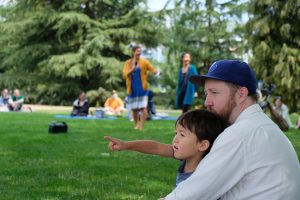
Dave Nguyen-Stone
British Columbia Director


John 19.25b-42
Will I See You Again?
Our doorbell rang at the worst possible time on a late April morning. My hand shook as I opened the door and struggled to maintain composure. A friend’s father had come to pick up a package of cloth diapers for his first grandchild. We shared small talk for a moment, but the ridiculousness of the present situation was too much. When he asked how I was doing, I obliged: “Well, I just got a phone call saying that my nephew passed away…” How do you respond to a statement like that? This poor, kind, grandfather had just come to get diapers for his grandchild. In that moment he was gracious and compassionate, but I don’t doubt he felt a certain sense of relief leaving the sudden heaviness of our porch conversation.
I wept in Kim’s arms. I had to explain to our young kids what had happened to their cousin. Then began the travel arrangements to fly to the other side of country to be with family.
swimming accident in Guatemala while serving in a gap-year program with his church. Uncertainty surrounded those early days of being back home. When the news came that his body had been found, it was only slight comfort. He was cremated and flown home weeks later.
As I spoke at his funeral, I reflected on the ways my nephew had changed me. He turned teenaged me into an uncle. I remembered fondly our shared experiences of his first baseball game and taking him for spins in the neighbourhood with his beginner’s driver’s license. I saw his theological mind taking shape, as our later conversations were about notions of heaven and resurrection. The closing line in my eulogy was “See you in the resurrection, kid.”
But more honestly, I could have asked, “Will I see you again?” This is the question that has haunted me ever since his death. The crippling “What ifs.” I choose to follow Jesus, and hold out hope for the resurrection, but following Jesus leads through places where loved ones die unexpectedly — through valleys of shadows of death. Then I think of the disciples whose lives had been changed by Jesus. Disciples who followed, abandoned, and betrayed; and Mary, along with other women, who stood by Jesus’ side until his burial — both faithful and unfaithful could not have anticipated Jesus’ sudden death. That he was given a tomb was only slight comfort. On this day, with the stone rolled over the tomb, there is no revelation. There is grief, there are tears, and there are the frightening moments when our doubts are given voice: Will I see you again?
It can also be a day to remember that from the cross, Jesus entrusted his mother into the care of John. She was not alone in her grief that day. It can be a day when I remember the porch conversation that began with the good news of a growing family. As awkward as it was, I was not alone in my grief.
It can be a day when we honestly ask Jesus “Will I see you again?” and wait for him to answer.
Easter Sunday
Nigel Pollock
President
What hope is there at the grave? The Sermon on the Mount is brilliant teaching, but it does not fill the void. The cross may be comforting in its example but one more death in the past does not change very much today. The only thing that brings hope is the Resurrection of Jesus.
Easter Sunday changes everything forever. Death is defeated, sin can be forgiven, eternal life is now a possibility, comfort is available. The empty grave signals that death is not the end. Easter Sunday confirms that the events of Good Friday have been successful. Mission accomplished. We have a different understanding because we know that Jesus is alive and is coming again. We weep but have a comforter.
Earlier today I sent two cards. One person had lost his wife, the other their father. Tomorrow a colleague will bury her husband’s dad. In all cases it has been easier because there is a different perspective. They mourn, but not as those without hope. We should hold on to those we love but we can also hold onto the one who holds onto us.
Jesus tells Mary in the garden not to hold onto him because he has not yet gone to the Father. Later when he appears to the disciples, he shows them his hands and feet and the spear wound in his side. He comes to them in the midst of grief and brings them peace through his presence and reassurance from his word.
I have a number of friends battling cancer at the moment. Some may have gone home by the time you read this. Many of us have felt keenly the losses occasioned by Covid, others grieve the loss of health or work or declining ability.
My prayer for us all is that we would know afresh the reality of that first Easter. That the risen Jesus would come to us again in the places we have locked, like the disciples, for our own protection and that through the grief and confusion we would share love, joy, and hope.
One day my body will lie cold and grey
If you look, please remember that I am not there
One day a stone will record who I was
If you come, please remember that all is not lost
This day is a comma not a full stop
I sleep for the evening, but morning will come
One day you may miss me and shed a small tear
But the story’s not over and Jesus is near
One day the trumpet will sound long and clear
Together forever with all we hold dear.
Life in my name has an expiry date. Life in his name goes on forever.
Christ is Risen. He is Risen Indeed.

Nigel Pollock
President

What hope is there at the grave? The Sermon on the Mount is brilliant teaching, but it does not fill the void. The cross may be comforting in its example but one more death in the past does not change very much today. The only thing that brings hope is the Resurrection of Jesus.
Easter Sunday changes everything forever. Death is defeated, sin can be forgiven, eternal life is now a possibility, comfort is available. The empty grave signals that death is not the end. Easter Sunday confirms that the events of Good Friday have been successful. Mission accomplished. We have a different understanding because we know that Jesus is alive and is coming again. We weep but have a comforter.
Earlier today I sent two cards. One person had lost his wife, the other their father. Tomorrow a colleague will bury her husband’s dad. In all cases it has been easier because there is a different perspective. They mourn, but not as those without hope. We should hold on to those we love but we can also hold onto the one who holds onto us.
Jesus tells Mary in the garden not to hold onto him because he has not yet gone to the Father. Later when he appears to the disciples, he shows them his hands and feet and the spear wound in his side. He comes to them in the midst of grief and brings them peace through his presence and reassurance from his word.
I have a number of friends battling cancer at the moment. Some may have gone home by the time you read this. Many of us have felt keenly the losses occasioned by Covid, others grieve the loss of health or work or declining ability.
My prayer for us all is that we would know afresh the reality of that first Easter. That the risen Jesus would come to us again in the places we have locked, like the disciples, for our own protection and that through the grief and confusion we would share love, joy, and hope.
One day my body will lie cold and grey
If you look, please remember that I am not there
One day a stone will record who I was
If you come, please remember that all is not lost
This day is a comma not a full stop
I sleep for the evening, but morning will come
One day you may miss me and shed a small tear
But the story’s not over and Jesus is near
One day the trumpet will sound long and clear
Together forever with all we hold dear.
Life in my name has an expiry date. Life in his name goes on forever.
Christ is Risen. He is Risen Indeed.
Week after Easter – Resurrection Scenes
Monday, April 18
John 20: 11-18
Reflect: On this day after celebrating Easter, it may be difficult for us to hope and trust that Jesus is really alive. Place yourself in this gospel story. Imagine yourself outside the tomb where you know Jesus has been buried. Let your doubts and fears rise. Ask Jesus for what you want or need. Wait and see what comes to mind. This week following Easter, ask for your own encounter with the resurrected Jesus. Continue to listen as Jesus may speak your name.


John 20: 11-18
Reflect: On this day after celebrating Easter, it may be difficult for us to hope and trust that Jesus is really alive. Place yourself in this gospel story. Imagine yourself outside the tomb where you know Jesus has been buried. Let your doubts and fears rise. Ask Jesus for what you want or need. Wait and see what comes to mind. This week following Easter, ask for your own encounter with the resurrected Jesus. Continue to listen as Jesus may speak your name.
Tuesday, April 19
Anne Douglas
Director of Coaching
John 21:1-14
A Meal With Jesus
By the same sea where he had called Simon Peter to himself through the first miraculous catch of fish, Jesus, unrecognizable in his resurrection body, warmly greeted the disciples and asked one of his piercing questions: “Friends, haven’t you any fish?” It was Jesus-style gentle irony, of course, because he then directed them to a catch of fish far beyond their expectations. And, he had already prepared a breakfast of fish for them.
It’s such a mystery that even when the disciples went back to what characterized their old life, he still blessed them beyond what they could have asked or imagined. I know how they may have felt. Countless times when I don’t feel I’m doing very well, when my old patterns are prevailing or my efforts yield nothing, Jesus still blesses me extravagantly.
What followed in John 21 was an astounding breakfast on the beach, astounding because in his resurrection Jesus had reclaimed his Kingship — what king makes a meal for his subjects?
The last meal Jesus had prepared for them was supposed to be the last supper, and here was a gorgeous meal cooked on a beautiful beach for hungry fishermen to enjoy with their favourite person, the person whom they have missed and for whom they have grieved and longed.
If you’re like me, the best intimate conversation happens around food. For someone to prepare a meal for me is a profound act of love. To orchestrate the details of the fire, the coals, the fish, and the bread took careful planning and thought, food service logistics I don’t necessarily associate with a first-century Jewish man.
Yet, counter-cultural as ever, Jesus prepared a feast. The image of these men, sitting, laughing, eating together in wonder around a fire on the beach reminds me of my years at camp, where some of the most transformative moments happened at campfire. And now, on our homestead, eating with people feels like a holy act, so close to the land and animals that provide the food, just as Jesus and his friends sat next to the sea and ate the fish that came from it.
Jesus, in his stunning goodness, generosity and kindness, has continually given me harvests so wonderful I can hardly manage to drag the net to shore. He has continually made me meals, preparing tables before me in the presence of my enemies, and gently beckoning me to eat with him.
When I’m feeling most overwhelmed, troubled or self-condemning, that’s when I want to eat alone. But Jesus says no, eat with me. He prepares me meals and invites me to partake. The meaning of the resurrection, the outcome of victory over sin, is that now we can eat in perfect fellowship with Him. The astonishing message of the cross is that his desire to both bless us and be with us can be manifest in our lives, in glorious joy and wondrous intimacy.
Reflect: Close your eyes and imagine Jesus preparing and serving one of your favourite meals to you. What details does he take care to plan? What do you notice? What do the two of you talk about as you eat together? How do you feel when he smiles at you?
Wednesday, April 20
Prayer: When you are eating an actual meal alone this week, picture Jesus with you. Imagine his joy at eating with you in perfect fellowship because of what he did on the cross. Tell him about your day: your joys, your fears, your comforts. Notice what he says and does.
Thursday, April 21
Family Exercise: When you are eating a meal with family or friends, imagine Jesus there with you all. He may smile at you across the table or laugh at one of your stories. Imagine his joy at the connection between people and the connection with him. Notice how it makes the meal different to imagine his presence there.
Friday, April 22
Scripture: John 20:19-22
Reflect: Read this passage and notice how your life may be reflected here. With this pandemic have you faced quarantine, living behind locked doors, closed camps and campuses for fear of what you might catch or spread? What are you afraid of today as you look ahead this spring? Imagine Jesus comes to you and your community right past those closed doors. Knowing your reality, Jesus speaks to YOU: “Peace be with you.” Then he breathes his Holy Spirit into you – not only for today but every day going forward. Rest with Jesus and this hope for a while today.


